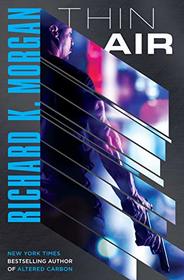Richard K. Morgan unleashes his signature mayhem, and almost balletically choreographed sex and violence, in a classic Western-inspired narrative set on Mars about 150 years after humanity established its first settlements on the Red Planet. The dream of terraforming, and rendering Mars into Earth II, has been abandoned, but huge areas such as the Mariner Valley and the Hellas impact crater have been encased in a bubble of atmosphere, allowing the development of towns and cities, home-grown industries and organized crime. But Mars is also the dumping ground for Earth's unwanted masses, a new Botany Bay -- and this this mix of Mars-born, convict labor, indentured servants, chancers who have used up most of their nine lives all sets up a deadly brew of desperation, resentment, exploitation, and the siren call of one big break.
Because this is Richard K. Morgan, the scene-setting, social construction, and ambient technology is clever and challenging, and feels very real and lived-in -- Morgan's superpower is the ability to not only come up with intriguing future technology, but to think it all through carefully (and sometimes movingly). He works out how that technology affects the society in which it is used, well beyond the point where a lesser author would shrug and say "that'll do"... In a Morgan novel, you see how technology changes people, and how people figure out tweaks to use the technology to their advantage, in ways that the designers never imagined.
Morgan isn't a great believer in exposition, or info-dumps -- which is good, because his worlds are completely immersive experiences from the get-go. But it makes demands on you as a reader, as you try to process complicated personal and political situations, baffling future technology, and throw away references to the history and geography (or should I say "areography") of Mars. you could easily read 100 pages or so before you are entirely sure who's doing what to whom, and why ... and what the heck is a "lamina," and a "'branegel," and why is everyone wearing sunglasses all the time? Stick with it, because it's well worth the effort.
I have a couple of relatively minor reservations. I think Morgan stretches it out a little overlong, so that the resolution, when it comes feels a bit like anti-climax. As if there has to be some resolution, and it might as well be that.
And I wish someone had talked Morgan out of his infatuation with "interesting" verbs. No one "smears" a smile on their face. No one "gusts" -- they "say." This is especially disappointing because, Morgan really does, otherwise, write so very well.
Because this is Richard K. Morgan, the scene-setting, social construction, and ambient technology is clever and challenging, and feels very real and lived-in -- Morgan's superpower is the ability to not only come up with intriguing future technology, but to think it all through carefully (and sometimes movingly). He works out how that technology affects the society in which it is used, well beyond the point where a lesser author would shrug and say "that'll do"... In a Morgan novel, you see how technology changes people, and how people figure out tweaks to use the technology to their advantage, in ways that the designers never imagined.
Morgan isn't a great believer in exposition, or info-dumps -- which is good, because his worlds are completely immersive experiences from the get-go. But it makes demands on you as a reader, as you try to process complicated personal and political situations, baffling future technology, and throw away references to the history and geography (or should I say "areography") of Mars. you could easily read 100 pages or so before you are entirely sure who's doing what to whom, and why ... and what the heck is a "lamina," and a "'branegel," and why is everyone wearing sunglasses all the time? Stick with it, because it's well worth the effort.
I have a couple of relatively minor reservations. I think Morgan stretches it out a little overlong, so that the resolution, when it comes feels a bit like anti-climax. As if there has to be some resolution, and it might as well be that.
And I wish someone had talked Morgan out of his infatuation with "interesting" verbs. No one "smears" a smile on their face. No one "gusts" -- they "say." This is especially disappointing because, Morgan really does, otherwise, write so very well.




